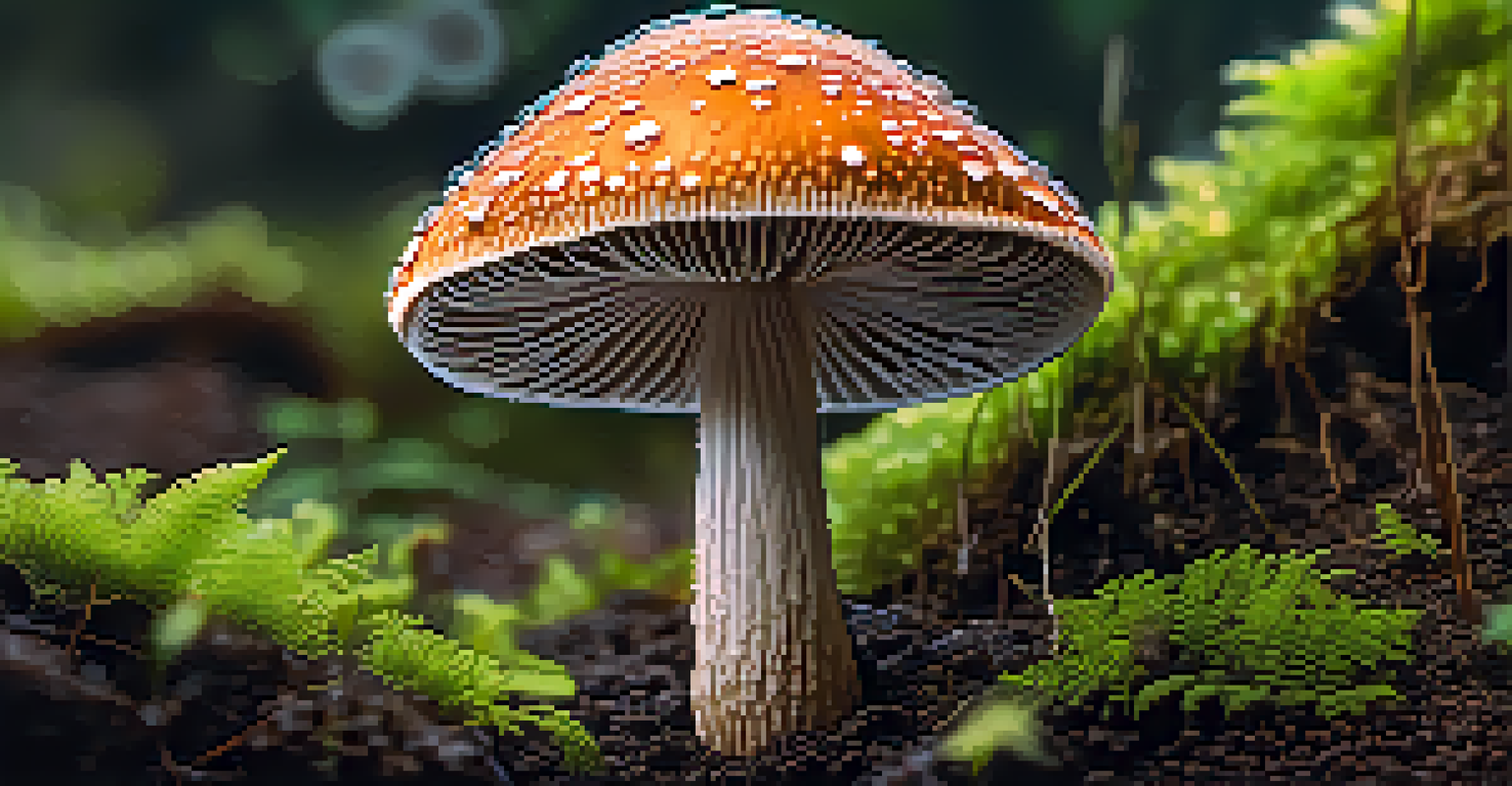Entheogens and Their Psychological Effects on Addiction

What Are Entheogens and Their Historical Context
Entheogens are substances that induce altered states of consciousness, often used in spiritual or religious contexts. Historically, various cultures have utilized these plants and fungi, such as peyote and psilocybin mushrooms, for healing and introspection. This rich history frames our understanding of how these substances might play a role in modern psychological practices.
Psychedelics can help us see ourselves more clearly and can help us confront things that we might be avoiding.
The term 'entheogen' itself comes from Greek, meaning 'generating the divine within.' This highlights the profound, often spiritual experiences users report, which can lead to significant personal insights. Many ancient civilizations, like the Aztecs and Indigenous tribes, viewed these substances as sacred, believing they connected them to a higher power.
In contemporary settings, there's a growing movement to reassess the potential therapeutic applications of entheogens. As society shifts towards a more holistic approach to mental health, understanding their historical use can provide important context for potential benefits in treating conditions like addiction.
The Psychological Mechanisms of Entheogens
Entheogens interact with the brain's serotonin receptors, particularly the 5-HT2A receptor, which plays a role in mood and perception. This interaction can lead to altered states of consciousness, facilitating experiences that some describe as profoundly transformative. These experiences can shift perspectives, allowing individuals to confront and process difficult emotions and memories.

Furthermore, the neuroplasticity induced by these substances may help create new neural pathways, which can alter habitual thought patterns associated with addiction. Think of it as giving the brain a fresh canvas to paint new, healthier habits. Through this lens, entheogens might offer a unique opportunity to break free from addiction's cyclical grip.
Entheogens and Their Healing History
Entheogens have a rich historical context in various cultures, used for spiritual and healing purposes that inform their potential therapeutic applications today.
Research has suggested that the subjective experiences during these altered states can lead to feelings of interconnectedness and ego dissolution. Such feelings may help individuals realize the underlying causes of their addiction, fostering a deeper understanding of their behaviors and motivations.
Entheogens in Treating Substance Use Disorders
Recent studies have shown promising results in using entheogens, particularly psilocybin, to treat various substance use disorders. For instance, clinical trials demonstrated that participants who underwent psilocybin therapy experienced significant reductions in cravings and withdrawal symptoms. This offers a glimmer of hope for those seeking alternatives to traditional addiction treatments.
The experience of dissolution of the ego is often described as a transformative experience that can lead to profound changes in behavior and perspective.
One of the key advantages of entheogen-assisted therapy is its potential to enhance therapeutic processes. By facilitating deep, introspective experiences, these substances can help individuals uncover the root causes of their addiction. It’s akin to shining a flashlight into the dark corners of the mind, illuminating hidden fears and traumas that often fuel addictive behaviors.
Moreover, the therapeutic setting in which these substances are administered plays a crucial role. Guided sessions with trained professionals create a safe environment, allowing individuals to explore their experiences without fear or judgment. This supportive framework can significantly enhance the overall effectiveness of the treatment.
Challenges and Risks of Using Entheogens
Despite the potential benefits, using entheogens is not without its challenges and risks. Individual reactions can vary widely; while some may experience breakthroughs, others could encounter overwhelming anxiety or distress. This highlights the importance of appropriate screening and preparation before embarking on such journeys.
Additionally, there is a risk of misuse or unsupervised use, which can lead to harmful consequences. Entheogens should not be viewed as a magic bullet for addiction but rather as a complementary tool in a broader therapeutic approach. Education and professional guidance are essential to navigate this complex landscape safely.
Therapeutic Benefits of Entheogens
Recent studies indicate that entheogens like psilocybin may significantly aid in treating substance use disorders by fostering deep introspection and emotional processing.
Furthermore, the legal status of many entheogens complicates their accessibility for therapeutic use. In many regions, these substances remain classified as illegal, hindering research and the implementation of evidence-based treatments. Advocacy for policy changes is crucial to unlock their potential benefits in addiction recovery.
Personal Stories: Successes with Entheogen Therapy
Many individuals have shared their transformative experiences with entheogen therapy, highlighting its potential in overcoming addiction. For example, one participant in a study reported that after a psilocybin session, they felt a profound sense of clarity regarding their substance use, enabling them to make lasting changes. These personal anecdotes often serve as powerful testimonials to the efficacy of such treatments.
Another individual described how their experience with ayahuasca helped them confront long-buried trauma, which had been a significant driver of their addiction. By processing these emotions in a supportive environment, they found the strength to address their substance use head-on. Stories like these shed light on the transformative power of entheogens in a therapeutic context.
These narratives not only provide hope for those struggling with addiction but also emphasize the need for continued research and understanding. They remind us that behind every statistic is a human story, showcasing the potential for healing and recovery through innovative approaches.
The Role of Integration in Entheogen Therapy
Integration is a crucial aspect of entheogen therapy, as it involves making sense of the experiences encountered during the sessions. After experiencing altered states, individuals often need support to translate insights into everyday life. This process can significantly impact the effectiveness of the therapy, ensuring that the benefits extend beyond the session itself.
Therapists often guide clients through integration, helping them reflect on their experiences and how they relate to their addiction. This might involve journaling, sharing with a support group, or engaging in additional therapy sessions. By actively processing the experience, individuals can better understand their triggers and develop healthier coping strategies.
Importance of Safe Integration
Successful entheogen therapy relies on the integration of experiences through guided support, ensuring individuals translate insights into meaningful life changes.
Moreover, community support plays an essential role in the integration process. Connecting with others who have undergone similar experiences fosters understanding and validation, creating a safe space for sharing and growth. This communal aspect can enhance the overall therapeutic journey, reinforcing the idea that no one is alone in their struggle.
Looking Ahead: The Future of Entheogens in Mental Health
As research into entheogens continues to expand, their potential role in mental health treatment is becoming increasingly recognized. Ongoing studies aim to explore their efficacy in treating not only addiction but also other mental health conditions like depression and PTSD. This evolving landscape highlights the need for continued dialogue and exploration in the field of mental health.
Public perception is also shifting, with more individuals advocating for the therapeutic benefits of entheogens. As awareness grows, so does the push for policy changes that would allow for safer, regulated use in clinical settings. These movements can help pave the way for innovative treatment options that prioritize patient well-being.

Ultimately, the future of entheogens in mental health depends on a balanced approach that combines scientific research with compassionate care. By fostering an environment of understanding and exploration, we can unlock the potential of these substances to support individuals in their journeys toward healing and recovery.